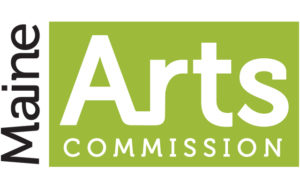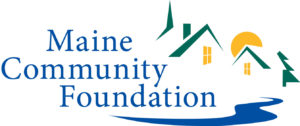Kevin James: Demystifying Fine Art
Based on an interview with artist Kevin James of Smithfield, Maine. Interviewed and written by Mary Haley, Project Coordinator for Wesserunsett Arts Council.

“People think that art is some mysterious thing, like alchemy or something, it occurs in some place they don’t get to see”, says artist Kevin James, a resident of Smithfield, Maine, he’s referring to the beauty of the Rural Open Studio Tour that he has participated in since its inception. The Rural Open Studio Tour is a means to what he calls “demystifying the making of art” and aptly observes that when people understand the process they can appreciate the art more.
James is 67 years old and an Orrington, Maine native, but he spent the majority of his adult life alternating between the rocky shores of Mount Desert Island, Maine and the sunny sands of Palm Beach, Florida. Observing North Pond out James’ front window it’s clear he is drawn to the water.
James didn’t grow up with the awareness that he could be an artist. He describes his youth jovially as, “misspent”, but follows up more seriously that he always felt at odds with the world. One of his first jobs was painting billboards on I-95, which he admittedly fibbed his way into, and it was James’ awakening to paint and color. His first billboard was 20 by 60 feet and it took him three days, he eventually knocked that time down to 8 hours.

James first started painting with watercolor, and when he wanted to paint bigger pieces he moved to acrylics and then eventually oil paints. Twenty years ago, James abandoned paint brushes for painting knives when working in oil. On his studio bench is a cup full of spatula-like knives, of all sizes, and the texture they make on canvas is drastically different from typical brush strokes.
Oil paint isn’t his only medium though. Looking around his basement studio—he’ll move to his outdoor studio in the spring—there are numerous projects in different stages of completion. Having multiple projects going allows him a fresh eye for each one. Besides oil James works in watercolor, acrylic, ink, collage, and sculpture.
Throughout his life that diversification has paid off. James has done antique restoration, partnered with event planners and interior designers to create scenic paintings and decorative arts, he has been commissioned for residential murals and replicated famous paintings from the Louvre Museum and Monet’s Garden for themed events.
When asked how many hours per week he spends on art, James laughs and says, “here is where a left-brain question meets right-brain brain, in that I have no idea… it’s all the time”. If James isn’t making art he’s thinking about art, looking at art, and researching art. Something as relaxing as reading a book of poetry can inspire his artwork. There is no punch-out clock for James, art is the medium of his life. Whether he finds himself on the Maine coast, in the west of Ireland, or at his home on the lake, landscape and natural elements are his inspiration and go-to subject matter. He muses he could have started out painting the scenes of his youth, mean streets and jails, but he says “art was something else”, it was a truth and beauty that was absent in his adolescence.

The conversation moves from Palm Beach to “life in Maine… which is different on a hundred different levels”, says James, its stillness and landscape has always been one of his greatest inspirations but he’ll also tell you that rural Maine offers unique challenges for any artist. There are more opportunities in urban settings—more public art and more galleries. In Galway, Ireland, where he lived for some time, James saw a far greater appreciation for art. Art is big business in America, but as a commodity, it’s not woven into the fabric of civic life as it was in Galway. When asked how do we change that perception, James says it can be done on the individual level, “we need to create opportunities to expose people to art, and not necessarily under a fair tent but through personal experiences and transparency”, like the Rural Open Studios Tour and interviews such as this one. This idea is supported by his own experiences, 80% of the people who have purchased his work have never bought art before and it’s because they connect with him, the process, and the story behind the art, that they buy. In rural Maine, James says artists need to make themselves accessible and transparent to connect with buyers and begin that art appreciation process, “if your work is honest then you don’t have to worry about selling it, it will”.
Art and artists play a big role in communities, and no matter how different their voices are James believes they cannot remove themselves from those communities. He knows that what artists do is important, not just to them, but to society, “the world needs more art… and out of the box thinking, in all areas whether it be commerce or politics”. He believes art builds a more rounded person which is why he advocates that art and art resources, especially in public schools, should not be short-changed. James sums it up in a play he wrote titled, Painting is a Verb, not a Noun, which illuminates his belief that “it is the process, not the product that is of the most importance”.
Kevin James can be contacted through his website, KevinJamesStudios.com. Studio visits can be easily arranged at any time but is open to the public June through September.
You can also see his artwork at:
Lebanese Heritage Mural, 51 Main Street, Waterville ME
Wildflower mural, 14 Madison Avenue, Skowhegan ME


